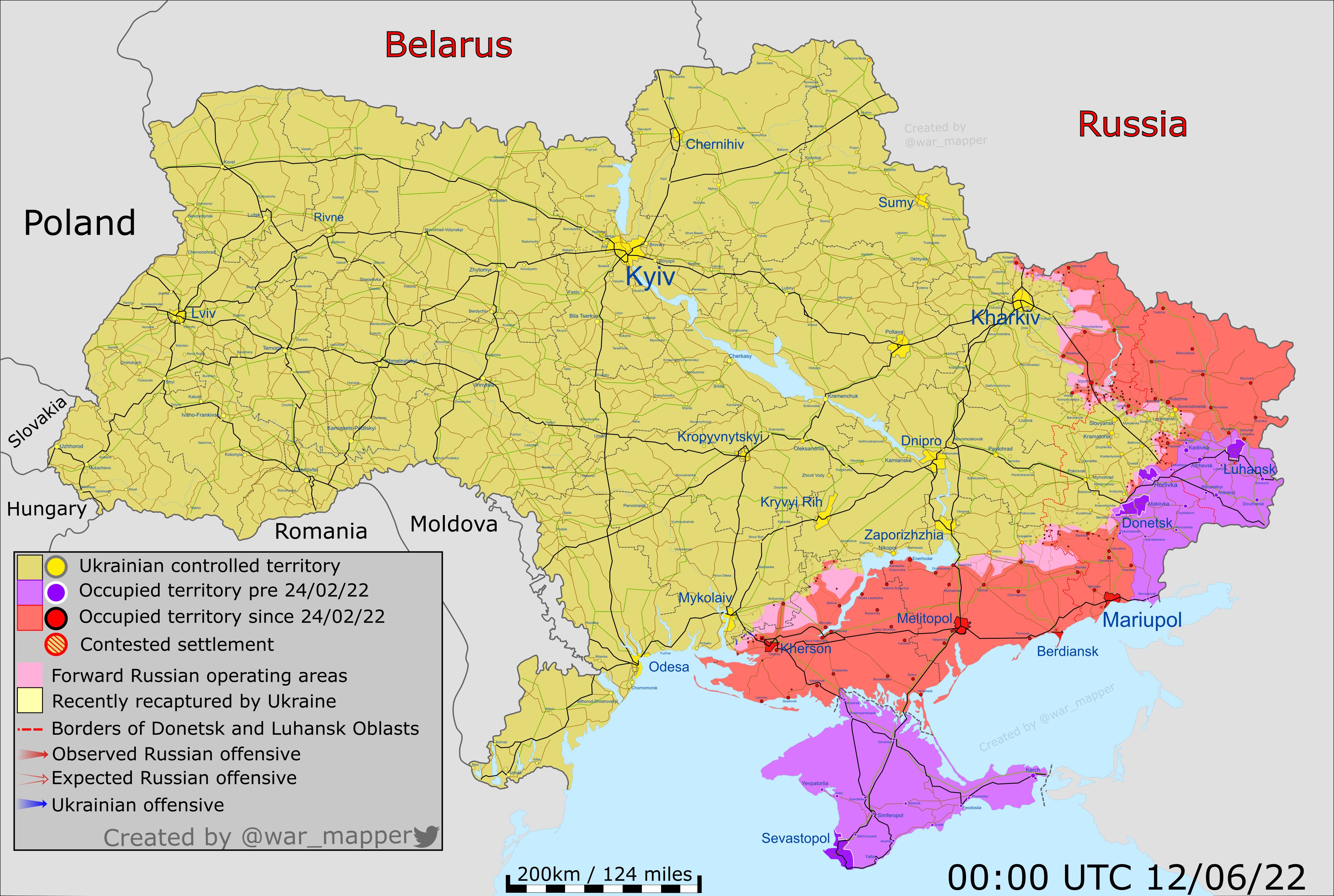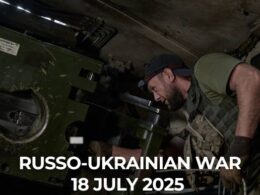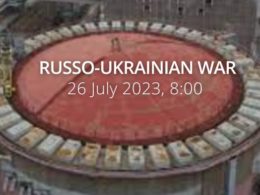Russian forces once again pushed Ukrainian units away from the city center of Sievierodonetsk, Luhansk Oblast, as the fiercest battles rage in the area. In Donetsk oblast, Ukraine not only repelled multiple Russian attacks but also liberated three villages. Ukraine Army chief calls on the US to provide more 155 mm artillery. President Zelenskyy says that 200-300 Ukrainian soldiers die every day. There will be no pardon for the British citizens sentenced to death in occupied Donetsk, says the Russian occupation administration head. Up to 300,000 tonnes of grain could be in Ukrainian warehouses destroyed by Russia last weekend, according to a minister.
Operational situation
In Kharkiv Oblast, the Russian troops attacked Izbytske and Rubizhne in the north, trying to drive out the Ukrainian group of forces away from the border and eliminate the threat of de-occupation of Vovchansk.
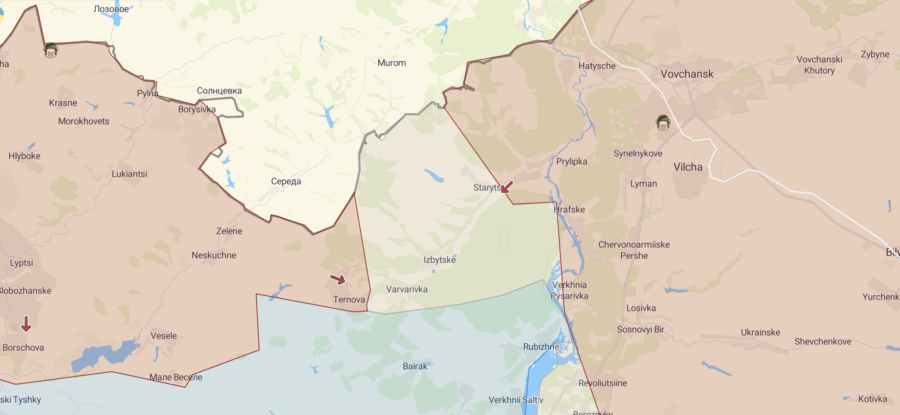
In the area of Sloviansk, Donetsk oblast, Russian forces again tried to storm Dolyna and Bohorodychne but were repelled. But in the east-northeast of Sloviansk, Russians didn't take active action again, resorting only to the shelling of the areas of Mayaky and Serebrianka.
Heavy fighting continued in Luhansk's Sievierodonetsk, as Russians shelled the city with artillery and rockets and re-took the city center once again. The Ukrainian troops keep maintaining bridgeheads and supply lines into the city:
"There is no threat to the encirclement of our troops in Luhansk Oblast," says the oblast's head Serhii Haidai.
In the area of the Popasna bulge in Luhansk Oblast, Ukrainian forces repulsed the Russian attacks on Vrubivka from two directions, and on Zolote. Further south, in the area of Bakhmut, two more Russian attacks failed near Dolomitne.
"In some areas of the Donbas, Ukraine's Armed Forces are not only defending but are also gradually advancing. Our soldiers have recently liberated three villages in Donetsk Oblast and moved the front line by 15 kilometers," the Joint Forces Task Force stated on Facebook.
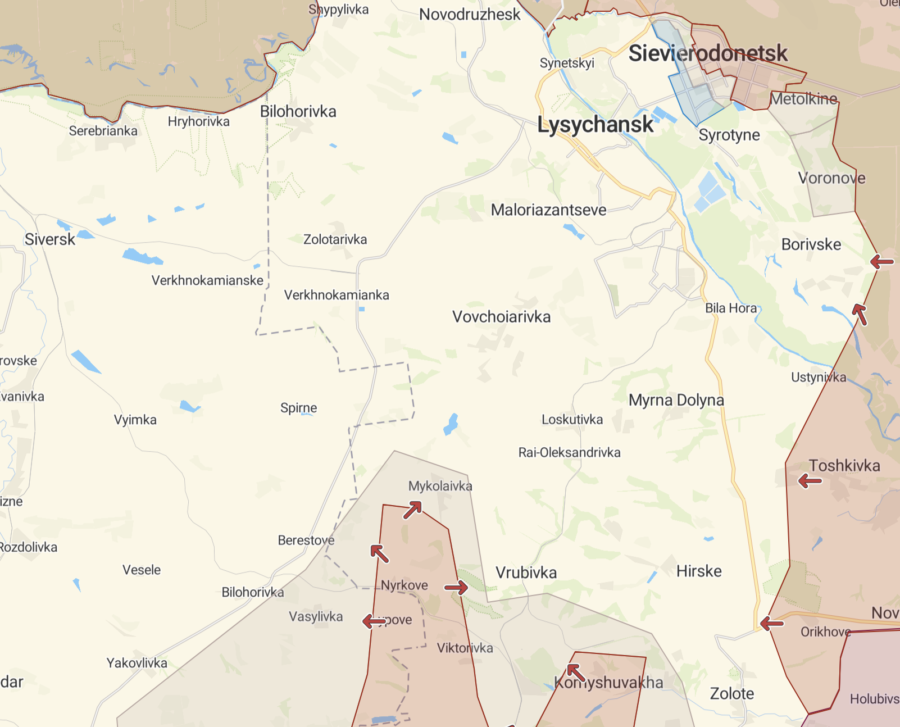
Russia continued the maritime blockade of Ukrainian ports, and didn't conduct offensive operations in Ukraine's south carrying out only several MLRS attacks.
Morning report day 110 – June 13
The report is based on media reports, expert analyses, and official information posted online.
Information from the General Staff as of 06.00 13.06.2022, supplemented by its [18:00 assessment] is in the drop-down menu.
In the Volyn, Polissia, and Siverskyi directions there are without significant changes.
In the Siverskyi direction, Russian occupiers fired artillery and mortars at the positions of the Defense Forces in the area of Hrinivka, Chernihiv oblast. [Yesterday, they shelled the positions of our troops, as well as civilian infrastructure in the settlements of Khrinivka, Chernihiv oblast, and Oleksandrivka, Sumy oblast.]
[In the Slobozhanskyi direction, Russian forces are fighting, trying to improve the tactical situation, and continue to improve the engineering equipment of defensive positions in the area of the settlement of Novy Burluk.]
- In the Kharkiv direction, Russian forces units continue to focus on conducting static defense and preventing the further advance of our troops to the State Border of Ukraine. Russian forces carried out assault operations in the direction of Ternove – Izbytske, had partial success and established itself on its northern outskirts. The remotely mined possible routes of deployment of our units in the area of the settlement of Petrivka, 20 km east of Staryi Saltiv. Conducted air reconnaissance of UAVs in the Shestakovo area.
- [Yesterday, Russian forces fired mortars, artillery, and rocket-propelled grenades at the settlements of Zamulivka, Bayrak, Husarivka, and Ruski Tyshky.]
- [Yesterday, Russian forces unsuccessfully stormed in the direction of settlements Starytsa - Rubizhne.]
- In the Sloviansk direction, enemy units focused their efforts on storming the settlements of Dolyna and Bohorodychne, but were unsuccessful. Russian forces, as part of the logistics of troops, replaced more than 100 units of damaged armored vehicles. [Yesterday, Ukrainian soldiers successfully repulsed Russian assault operations in the directions Dovhenke - Mazanivka and Dovhenke - Dolyna.]
In the Donetsk direction, the occupying forces are focusing on offensive operations to encircle our troops in the areas of Sievierodonetsk and Lysychansk, and to block logistics routes from Bakhmut. Continues measures to replenish losses. It moved more than 80 weapons and military equipment, including heavy armored vehicles and artillery systems, to the settlements of Kreminna and Starobilsk.
- In the Lyman direction, Russian forces did not conduct active hostilities but continued shelling the positions of our troops in the areas of the settlements of Mayaky, 10 km north of Sloviansk, and Serebrianka, 5 km northeast of Siversk.
- [In the Sievierodonetsk direction, Russian forces continued to use artillery and MLRS. Russia has deployed up to 7 battalion tactical groups to the city. It is trying to overcome the resistance of our troops and establish full control over the city of Sievierodonetsk.] Last night, Russian forces, with the support of artillery, carried out assault operations in the city of Sievierodonetsk, had partial success, pushed our units away from the city center, and hostilities continue. It fired artillery at the positions of the Defense Forces in the areas of the settlements of Lysychansk, Sievierodonetsk, and Toshkivka.
https://twitter.com/EuromaidanPress/status/1536279885194399745
- In the Bakhmut direction, our soldiers successfully repulsed the assault operations in the directions of Viktorivka - Vrubivka and Komyshuvakha - Vrubivka. Russian forces resumed offensive operations near the village of Zolote. It is fixed on the border of the Roty - Myronivka. To improve the tactical position and capture the dominant heights unsuccessfully conducted assault operations in the directions Dolomitne - Kodema, Dolomitne - Novoluhanske. Conducted air reconnaissance of UAVs in the Pokrovsk area.
- [Yesterday, in an attempt to resume the assault in the direction of Orikhove - Zolote, Russian forces received a decisive rebuff from Ukrainian defenders and withdrew.]
- In the Kurakhove direction, Russian forces launched an airstrike on the positions of our troops in the Krasnohorivka area, 15 km east of Kurakhove.
- In the Avdiivka, Novopavlivska, and Zaporizhzhia directions, Russian forces fired along the line of contact to prevent the transfer of reserves to other directions.
In the Pivdennyi Buh direction, Russian forces are conducting a static defense. The main efforts are directed at the maintenance of previously occupied territories. They carried out engineering equipment of positions in the areas of Shilova Balka and Prydniprovske settlements. To clarify the position of our troops, he conducted air reconnaissance of UAVs in the area of Davydiv Brid. [Yesterday, Russian forces fired artillery and MLRS on the areas of the settlements of Osokorivka, Trudolyubivka, Shyroke, Dobryanka, and Blahodatne.]
The Black Sea Fleet is upholding the maritime blockade of Ukrainian ports. Currently, the northwestern part of the Black Sea is guarded by 4️ missile ships, 1️ submarine, and 3️ large amphibious ships, carrying a total of 36 caliber cruise missiles, Operational Command South reports.”
Russia controls most of Sievierodonetsk, The Washington Post reports. “Ukraine, on the brink of losing the eastern region of Luhansk to Russia, is warning that its outgunned military desperately needs faster Western arms deliveries. Fierce street fighting is continuing in the strategic city of Sievierodonetsk, but “most of the city is controlled by Russians,” the Luhansk governor said Saturday. Meanwhile, an adviser to Ukraine’s government said their forces could respond with only about one artillery round for every 10 fired by Russia.”
Russians destroyed the second of three bridges to Sievierodonetsk and are shelling the last one, Ukrainska Pravda reports. "Overnight, the Russians destroyed the second bridge leading to the Regional Center. Right now they are massively firing artillery at the last one - the third overpass in the city. The Russians are throwing all their forces at cutting off" Sievierodonetsk. The next two or three days will be important, the head of the OMA, Serhii Haidai said. We are not ruling out offensives in other directions, namely the Lysychansk-Bakhmut highway, which the Russians are trying to take control of."
Belarus conducts mass military training and exercises, which work out the "transition from peacetime to wartime", the Defense Intelligence of Ukraine (DIU) reports. Belarus conducts mass military training and exercises to test the "transition from peacetime to wartime" On June 7, the Belarusian armed forces began regular combat readiness exercises. The main purpose of the training: "transition from peacetime to wartime." […] The training will address the protection and defense of military and civilian infrastructure, implementation of martial law measures, as well as counteraction to sabotage and reconnaissance groups.
Mobilization exercises with military commissariats are planned to be held in Gomel Oblast from June 22 to July 1. All categories of servicemen, units, military units, formations, and military administration bodies will be additionally involved in the training. The theme is similar: "the transition from peacetime to wartime." Also from June 28 to July 16 in the Zhlobin district of Gomel Oblast, it is planned to hold military training with servicemen of the newly created territorial troops.
According to British Defense Intelligence, (last 48 hours):
- Over the weekend, the battle around Sievierodonetsk has continued to rage. Over the coming months, river crossing operations are likely to be amongst the most important determining factors in the course of the war.
- The key, 90km long central sector of Russia’s frontline in the Donbas lies to the west of the Siverskyi Donets River. To achieve success in the current operational phase of its Donbas offensive, Russia is either going to have to complete ambitious flanking actions or conduct assault river crossings.
- Ukrainian forces have often managed to demolish bridges before they withdraw, while Russia has struggled to put in place the complex coordination necessary to conduct successful, large-scale river crossings under fire.
- Russia is using its overmatch in force ratio and artillery to gradually seize territory in and around Sievierodonetsk.
- Russia continues to seek to generate more combat units to deploy to Ukraine. In recent weeks, it has likely started preparing to deploy the third battalion from some combat formations. Most brigades normally only commit a maximum of two of their three battalions to operations at any one time. The third battalions within brigades are often not fully staffed - Russia will likely have to rely on new recruits or mobilized reservists to deploy these units to Ukraine.
- Deploying all three of their battalions simultaneously will likely reduce formations’ longer-term capacity to regenerate combat power after operations.
As of Monday 13 June, the approximate losses of weapons and military equipment of the Russian Armed Forces from the beginning of the war to the present day:
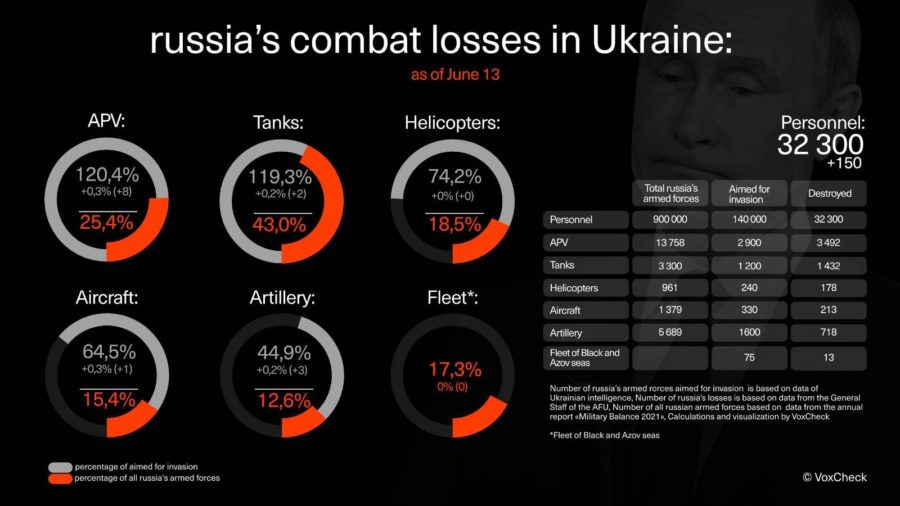
Russian forces suffered the greatest losses (of the last day) in the Bakhmut direction.
Approximately 10,000 Ukrainian soldiers have been killed since Russia invaded the country in February, according to a military adviser to President Zelenskyy, The Guardian reports. He added that in terms of daily Ukrainian casualties, around “200 to 300 die, no less”.
Humanitarian
Occupying forces will leave Mariupol without compensation and without heating in winter, Ukrainska Pravda reports. “Russian occupying forces are going to demolish ruined houses in Mariupol; they are not promising to fully compensate for the damage, and instead of heating the houses, they are preparing heating tents for the winter, [Petro Andriushchenko, adviser to the Mayor of Mariupol, wrote on Telegram.] There were reports from the occupiers of demolition within two weeks with a demand for eviction with reference to all the partially destroyed houses. The occupiers are not giving answers about where and how people will be relocated later, shifting the problem onto Mariupol residents again."
Millions of refugees from Ukraine have crossed borders into neighboring countries, and many more have been forced to move inside the country. The escalation of conflict in Ukraine has caused civilian casualties and destruction of civilian infrastructure, forcing people to flee their homes seeking safety, protection, and assistance the UNHCR reports. As of 9 June (no update as of 13 June):
Individual refugees from Ukraine recorded across Europe: 4,904,207
- Belarus, Hungary, Republic of Moldova, Poland, Romania, Russian Federation, Slovakia 2,574,093
- Other European countries 2,330,114
Refugees from Ukraine registered for Temporary Protection or similar national protection schemes in Europe: 3,206,642
- Hungary, Poland, Romania, Slovakia 1,290,949
- Other European countries 1,915,693
Border crossings from Ukraine (since 24 February 2022): 7,363,623
Border crossings to Ukraine (since 28 February 2022): 2,387,834
OHCHR recorded 9,585 civilian casualties in Ukraine as of June 9 (No update as of 13 June). 4,339 were killed (including 274 children) and 5,246 injured (including 443 children).
A specialist gang is smuggling valuable historic artefacts out of Ukraine into Russia, says international team of academics and digital technology experts who are tracking thefts
The "purposeful Russian move" focuses heavily on precious Scythian gold https://t.co/Q314yk20ch pic.twitter.com/dMAF6gs9J5
— Euromaidan Press (@EuromaidanPress) June 13, 2022
Environmental
Up to 300,000 tonnes of grain in destroyed warehouses, Ukraine's deputy agriculture minister says, Reuters reports. “Up to 300,000 tonnes of grain may have been stored in warehouses that Kyiv says were destroyed by Russian shelling last weekend, deputy agriculture minister Taras Vysotskyi said on Saturday.
Speaking on national television, Vysotskyi said, according to records, at the start of the war on Feb. 24 the warehouses at one of Ukraine's largest agricultural commodities terminals in the Black Sea port of Mykolaiv held 250,000-300,000 tonnes of grain, mainly wheat and corn.”
Ukraine grain exports via Poland and Romania face bottlenecks, the deputy foreign minister says, Reuters reports. “Ukraine has established two routes through Poland and Romania to export grain and avert a global food crisis although bottlenecks have slowed the supply chain, [Ukraine’s] deputy foreign minister said on Sunday.
Dmytro Senik said global food security was at risk because Russia's invasion of Ukraine had halted Kyiv's Black Sea grain exports, causing widespread shortages and soaring prices. Ukraine is the world's fourth-largest grain exporter and it says there are some 30 million tonnes of grain stored in Ukrainian-held territory which it is trying to export via road, river, and rail.”
How the ‘Energy Shock’ Has Upended the Global Economy, The Washington Post reports. “Just as the world was getting serious about a green-energy future, its dependence on fossil fuels struck home with a force not seen since the 1970s. Russia’s invasion of Ukraine combined with pressures unleashed by the pandemic sent the price of all forms of energy rocketing, with oil climbing more than 50% in the first half of 2022. That energy shock was at the heart of a surge in inflation that caused hardship and political headaches around the globe.
Consumers were hit particularly hard since spending on energy is difficult to cut. In the UK, regulators warned that the surge in global natural gas prices was set to drive the average household energy bill up another 42% in October when a price cap is adjusted higher, producing the biggest hit to living standards since the 1950s. […] The end result was a surge in inflation that the world hadn’t seen in decades, with energy making up more than half of the jump in major advanced economies. Beyond price concerns, there were worries that global power grids already strained by climate change could prove even more fragile, leading to blackouts that could put lives at risk. […]
By early June, there was no sign of an end to what had become a grinding, bloody war in Ukraine and little hope for big boosts in energy production, with the oil-rich OPEC nations agreeing to only a modest increase in oil output. […] JPMorgan Chase & Co. Chief Executive Officer Jamie Dimon said that oil had the potential to hit $150 or $175 a barrel and that the bank was bracing itself for an economic hurricane.”
https://twitter.com/EuromaidanPress/status/1536293551172100096
Legal
Amnesty accuses Russia of war crimes in Kharkiv, The Guardian reports. “Amnesty International has accused Russia of war crimes in Ukraine, saying attacks on Kharkiv - many using banned cluster bombs - had killed hundreds of civilians. The rights group said in a report on Ukraine’s second-biggest city published on Monday:
The repeated bombardments of residential neighborhoods in Kharkiv are indiscriminate attacks that killed and injured hundreds of civilians, and as such constitute war crimes. This is true both for the strikes carried out using cluster (munitions) as well as those conducted using other types of unguided rockets and unguided artillery shells.
The continued use of such inaccurate explosive weapons in populated civilian areas, in the knowledge that they are repeatedly causing large numbers of civilian casualties, may even amount to directing attacks against the civilian population.
Amnesty said it had uncovered proof in Kharkiv of the repeated use by Russian forces of 9N210 and 9N235 cluster bombs and scatterable land mines, all of which are banned under international conventions. Cluster bombs release dozens of bomblets or grenades in mid-air, scattering them indiscriminately over hundreds of square meters (yards). Scatterable land mines combine the worst possible attributes of cluster munitions and anti-personnel land mines, Amnesty said.
Unguided artillery shells have a margin of error of over 100m. The report, entitled ‘Anyone Can Die At Any Time’, details how Russian forces began targeting civilian areas of Kharkiv on the first day of the invasion on 24 February. […]
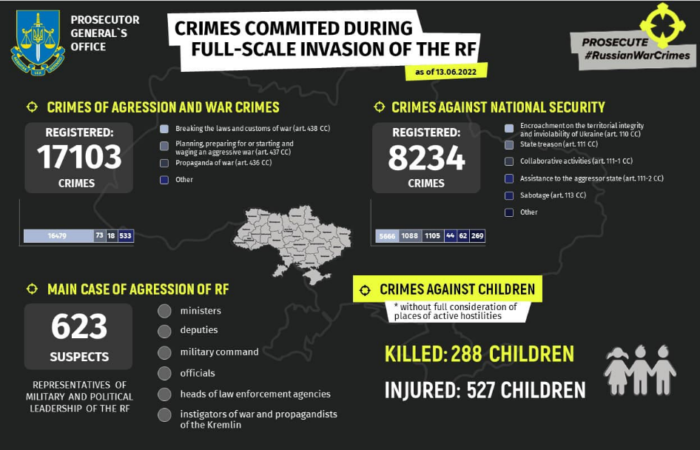 Amnesty stressed, “international humanitarian law prohibits indiscriminate attacks and the use of weapons that are indiscriminate by nature. Launching indiscriminate attacks resulting in death or injury to civilians, or damage to civilian objects constitutes war crimes.”
Amnesty stressed, “international humanitarian law prohibits indiscriminate attacks and the use of weapons that are indiscriminate by nature. Launching indiscriminate attacks resulting in death or injury to civilians, or damage to civilian objects constitutes war crimes.”
288 children were killed, and 527 children injured, the Office of the Prosecutor General of Ukraine reports as of June 9. 1971 educational establishments are damaged as a result of shelling and bombings, 194 of them are destroyed fully. 17,103 crimes of aggression and war crimes and 8,234 crimes against national security were registered.
No pardon for Britons sentenced to death, pro-Russian separatist leader (head of the Russian occupation authorities, - Ed.) says, Reuters reports. “The leader of the Russian-backed separatist Donetsk region said on Sunday there was no reason to pardon two British nationals who were sentenced to death last week after being captured while fighting for Ukraine. A court in the self-proclaimed Donetsk People's Republic on Thursday found Aiden Aslin and Shaun Pinner - and Moroccan Brahim Saadoun - guilty of "mercenary activities" seeking to overthrow the Republic.”
https://twitter.com/EuromaidanPress/status/1536316769224343552
Support
Zelensky: We already have 2,606 affirmative answers as to whether Ukraine needs modern missile defense systems, Ukrinform reports. “Ukraine needs modern missile defense systems. The supply of such systems was possible this year, last year, and even earlier. Did we get them? No. Do we need them? Yes. There have already been 2,606 affirmative answers to this question in the form of various Russian cruise missiles that have hit Ukrainian cities. Our cities, our villages for the period from February 24. These are lives that could have been saved, these are tragedies that could have been prevented if Ukraine had been listened to.”
https://twitter.com/EuromaidanPress/status/1536327273409748992
Ukraine Army chief calls on the US to provide more 155 mm artillery, Ukrinform reports. “The Commander-in-Chief of the Armed Forces of Ukraine, Valeriy Zaluzhny, in a phone call with the Chairman of the Joint Chiefs of Staff, General Mark Milley, informed him about the current situation at the front and the need for Ukraine to get more new artillery pieces as soon as possible. Zaluzhny said this on Telegram. I emphasized that Russian forces concentrated their main efforts in the north of the Luhansk region. They use artillery en masse and, unfortunately, they have a tenfold fire advantage. I reiterated my request to General Milley - to help us get more 155 mm caliber artillery systems in the shortest possible time.”
Shortage of Artillery Ammunition Saps Ukrainian Frontline Morale, The New York Times reports. “Nearly four months after Russia invaded, the Ukrainian military is running low on ammunition for its Soviet-era artillery and has not received enough supplies from its allies to keep the Russians at bay, Ukrainian officials and artillery officers in the field say.
The shortage has put Ukrainian troops at a growing disadvantage in the artillery-driven war of attrition in the country’s east, with Russia’s batteries now firing several times as many rounds as Ukraine’s. While the West is sending in weapons, they are not arriving fast enough or in sufficient numbers to make up for Ukraine’s dwindling arsenal.
The Western weapons, heavy, long-range artillery pieces, and multiple-launch rocket systems are more accurate and highly mobile, but it takes time to deploy them and train soldiers to use them. In the meantime, Ukraine is running out of ammunition for the older weapons.
On the front lines in Donbas, Ukrainian soldiers are being forced to conserve shells, and are often unable to return fire one for one. […]
Pentagon officials say that they have exhausted all efforts to scrounge up available Soviet and Russian weaponry and munitions for Ukrainian troops to use, after months of horse-trading with allies who were still using the old systems. A senior American military official acknowledged that the well had run dry, and said that Ukraine would likely need to depend on Western munitions systems to defend against Russia in the East. […]
On Friday, Ukraine’s deputy head of military intelligence, Vadym Skibitsky, told The Guardian newspaper that Ukraine was losing the artillery battle with Russia on the front lines because of the shortage of artillery shells for its older guns. He said Ukraine was firing 5,000 to 6,000 artillery rounds a day and had “almost used up all of our ammunition. By contrast, Russian forces are firing about 60,000 artillery shells and rockets each day in the Donbas fighting, according to a senior adviser to the Ukrainian military command who was not authorized to speak publicly. […]
Some European countries have shipped so many of their own ammunition reserves to Ukraine — in some cases up to 30 percent — that they’re increasingly anxious about replenishing their stocks, European Union officials said. Officials said that while there was still a relatively steady flow of military equipment from the E.U. and its allies, Ukraine was not receiving as much heavy artillery as it needs.”
E.U. leaders hesitant on Ukraine membership, The Washington Post reports. “It is not yet clear if the 27 E.U. countries will grant Ukraine “candidate status” — an early step on the long path to membership — or some sort of symbolic pre-candidate status, diplomats said. What seems certain is that Ukraine, as it fights for its life, will be let down.
While several E.U. officials, lawmakers, and leaders have pressed to expedite Kyiv’s bid, others have tried to temper Ukrainian expectations, stressing that membership might be decades away. In private conversations, some E.U. diplomats conceded that their governments are nervous about starting the accession process with a country at war. A few wondered if Ukraine had a shot at joining at all. […]
The gap between the full-throated support from top E.U. officials as they pose for pictures with Zelenskyy and the quiet skepticism of many E.U. diplomats hangs over preparations for the bloc’s June 23-24 summit — and has not gone unnoticed by Kyiv. “None of the 27 would say right in the face of the president ‘no,’ but what is happening behind the scenes is clear willingness to put obstacles into the process,” Olha Stefanishyna, Ukraine’s deputy prime minister for European and Euro-Atlantic Integration of Ukraine, said.”
New developments
- Zelenskyy warns of the wider effects of Russia’s aggression, The New York Times reports. “The whole global order will be threatened if Russia’s aggression is not met with sufficient consequences, President Volodymyr Zelenskyy of Ukraine said on Saturday. It is on the battlefield in Ukraine that the future rules of this world are being decided, he said in a virtual speech to the annual Shangri-La Dialogue, a gathering of defense ministers and security officials in Singapore. Let us save the whole world from coming back to the times when everything was decided based on the so-called right of might.
He also warned about the ripple effects of Russia’s Black Sea blockade that is preventing Ukraine from exporting much-needed grain. The world will face an acute and severe food crisis and famine in many countries of Asia and Africa, Mr. Zelenskyy said. The shortage of foodstuffs will inexorably lead to political chaos, which can result in the falling of many governments and the ousting of many politicians.” - The Head of State Duma of Russia Threatens Poland with Nuclear Strike, Ukrainska Pravda reports. “Radoslaw Sikorski, the European Parliament Deputy and former Foreign Minister of Poland, suggested providing Ukraine with nuclear weapons. He argued that Russia broke the terms of the Budapest Memorandum on Security Assurances by refusing to respect Ukraine’s sovereignty and integrity, so nuclear weapons should be returned to Kyiv, even though Ukrainians voluntarily disposed of them. "Sikorski is provoking a nuclear conflict in the center of Europe. He thinks neither about the future of Ukraine nor about the future of Poland. In case his suggestions are fulfilled, these countries will cease to exist, as will Europe as well,” the Head of the State Duma of the Russian Federation, Viacheslav Volodin, threatens.
- "Ukraine is bleeding": Ambassador Melnyk to Germany on Marder supplies, Ukrinform reports. “Ukraine's Ambassador to Germany Andriy Melnyk has once again criticized the host country's government for hesitating to provide the Ukrainian Armed Forces, suffering heavy losses, with armored combat vehicles that have even been prepared for shipment by manufacturers. […] Melnyk is a vocal critic of the German government, which he criticizes for its unwillingness to provide Ukraine with heavy weapons or for slowing down the implementation of the already approved decisions. At the same time, earlier, the ambassador said that Berlin would ship to Ukraine a batch of howitzers – even earlier than initially expected.”
- Russia’s invasion threatens to ‘trample the rules that protect us all,’ the US defense secretary says, The New York Times reports. “The United States defense secretary sought to shore up support for Ukraine among Asian countries on Saturday, saying at a security summit in Singapore that Russia’s aggression had wider implications for national sovereignty and the global order.
Russia’s invasion is what happens when oppressors trample the rules that protect us all, Mr. Austin told the defense ministers who had gathered in the city-state for the annual Shangri-La Dialogue. “It’s what happens when big powers decide that their imperial appetites matter more than the rights of their peaceful neighbors, he said. And it’s a preview of a possible world of chaos and turmoil that none of us would want to live in.”
Assessment
On the War
The Institute for the Study of War has made the following assessment as of Sunday 12 June:
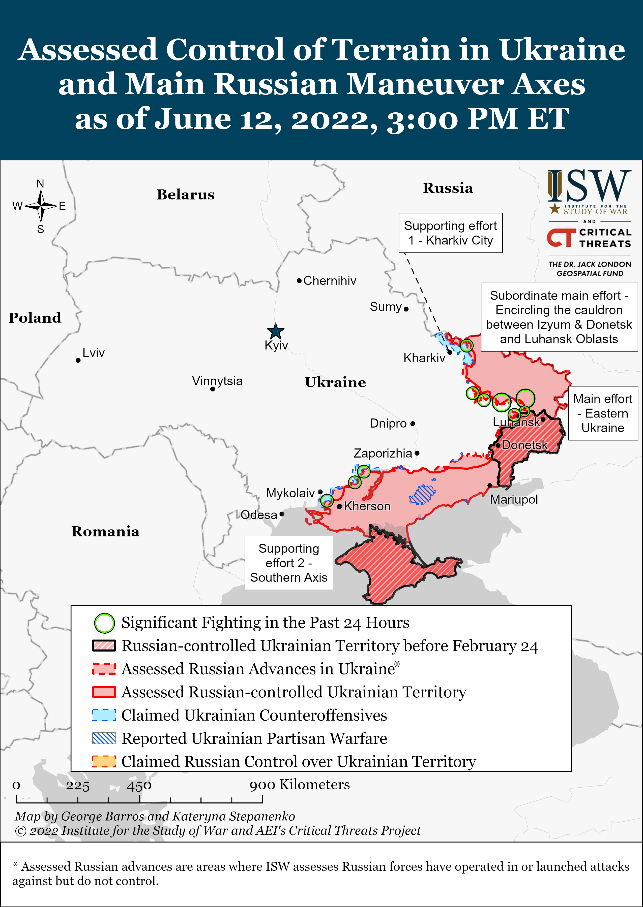 Pro-Russian sources are continuing to spread disinformation to sow anxiety and resentment among the Ukrainian population. Russian Telegram channels reportedly began spreading a fake mobilization order on June 12 that they falsely attributed to the Ukrainian General Staff. The fake order called for the mobilization of all eligible Ukrainian women to report for duty by “June 31” (sic).
Pro-Russian sources are continuing to spread disinformation to sow anxiety and resentment among the Ukrainian population. Russian Telegram channels reportedly began spreading a fake mobilization order on June 12 that they falsely attributed to the Ukrainian General Staff. The fake order called for the mobilization of all eligible Ukrainian women to report for duty by “June 31” (sic).
Russian forces continued ground assaults in and around Sievierodonetsk under the cover of heavy artillery fire but have yet to establish full control of the city as of June 12. Ukrainian troops maintain control of the Azot industrial zone. Head of the Luhansk Regional State Administration Serhiy Haidai stated that Russian forces destroyed two bridges across the Siverskyi Donets River between Sievierodonetsk and Lysychansk and are heavily shelling the third.
Russian forces should, in principle, be seeking to seize the bridges rather than destroy them, since Russian troops have struggled to cross the Siverskyi Donetsk River. They could hope to trap Ukrainian defenders in Sievierodonetsk by cutting off their retreat, but it seems unlikely that the benefit of catching a relatively small number of defenders would be worth the cost of imposing a contested river crossing on Russian troops. The Russians likely expect instead to be able to break out of their positions either around Toshkivka or from Popasna to the north and then encircle Lysychansk or attack it from the west bank of the Siverskyi Donets, thereby obviating the need to seize the bridges or conduct an opposed crossing. Russian troops conducted another unsuccessful attack on Toshkivka, which is likely an effort to renew their drive north toward Lysychansk on the west bank.
Key Takeaways
- Russian forces continued ground assaults in Sievierodonetsk and blew up bridges that connect Sievierodonetsk to Lysychansk across the Siverskyi Donets River in a likely attempt to cut Ukrainian ground lines of communication (GLOCs) that run from Bakhmut to Lysychansk and Sievierodonetsk.
- Russian forces made incremental gains to the southeast of Izium and will likely continue attempts to advance on Sloviansk from the northwest.
- Russian forces continued efforts to push Ukrainian troops back from contested frontlines northeast of Kharkiv City.
- Russian forces focused on maintaining defensive lines along the Southern Axis.“
Russia likely to seize all of Luhansk in coming weeks, US official says, The Washington Post reports. “Russia is likely to seize control of the entire Luhansk region of Ukraine within a few weeks, a senior US defense official said, as Ukraine sustains heavy casualties and its supplies of ammunition dwindle. Such a move would leave Russia short of its war aims of capturing all of Luhansk and Donetsk, which together make up the Donbas region of eastern Ukraine. But it would still amount to a win for Russian forces and create a new de facto front line that could last for some time.
The Ukrainian cities of Sievierodonetsk and Lysychansk, in Luhansk, are increasingly under duress and could fall to Russian forces within a week, the official said, speaking on the condition of anonymity because of the sensitivity of the issue.”
Behind enemy lines, scouts help Ukrainians execute deadly strikes, The New York Times reports. “While a lack of weapons, ammunition, and equipment hampers the Ukrainian military, there are signs that a partisan insurgency is growing in potency, allowing Ukrainian forces to deliver deadly strikes on Russian-controlled territory even in areas where it is dangerous and sometimes impossible to commit troops.
This week, partisan scouts working for Ukraine’s military behind enemy lines directed artillery attacks on two Russian bases in the occupied Kherson region that killed scores of enemy soldiers, according to a senior Ukrainian military official with knowledge of the attacks.
In one episode this week, the scouts approached a Russian army installation in the village of Chkalove, and discovered many foreign fighters stationed at the base along with Russian soldiers and heavy weaponry, the senior official said. They fed the coordinates for the base to a Ukrainian artillery unit stationed about 12 miles away. The Ukrainians then pulverized the base with shells, killing scores of fighters just after midnight on Thursday, said the senior official, who spoke on the condition of anonymity to discuss sensitive military operations.
Later that day, scouts directed another artillery attack, this time on a resort complex in Stara Zburivka, near the mouth of the Dnipro River, killing dozens of enemy soldiers, including two generals, the senior official said. […]
The scouts are local partisans who aid the Ukrainian military on Russian-occupied territory. They might be former soldiers or simply civilians gathering information like the location of enemy units. They can be men pushing potato carts, farmers, or a grandmother with a cellphone.
Ukrainian partisans have claimed credit for attacking Russian trains; targeting Russian proxies appointed to local government administrations; killing Russian soldiers, and supporting Ukrainian military efforts. Their support can prove crucial, both in southern Ukraine where Russia has captured territory and in the east where Ukraine finds itself outgunned and fighting to hold onto its land. […]
The official said that before the attack, the partisans approached some of the foreign fighters and after trying to speak with them, surmised that they were Arab. The foreign fighters appeared to be living in tents near buildings occupied by Russian troops, the official said. He said they were possibly part of a contingent of Syrian troops that arrived in Russia three weeks ago. […]
The exact shape and size of the insurgency in southern Ukraine are unclear and the resistance to Russian occupation can come in many forms — from helping direct attacks on enemy forces in coordination with the Ukrainian military to posting leaflets on street corners to demoralize the occupiers.”
Russia has not abandoned its plan to completely seize Ukraine, DIU states. Ukraine thwarted Putin's blitzkrieg plan to seize Kyiv, Kharkiv, and Odesa, so the occupiers are now focusing their efforts on eastern Ukraine, the representative of the Ministry of Defense of Ukraine, Vadym Skibitskyi, said. According to Ukraine's defense intelligence, Russia still has sufficient potential to wage a long war against Ukraine. “According to Vadym Skibitsky, Russian forces use 103 battalion tactical groups on the territory of Ukraine, which is directly involved in hostilities. Another 40 BTGs are in reserve and can be used against the Armed Forces of Ukraine.
The representative of the military intelligence of Ukraine also said that due to the military failures of the occupying forces, the General Staff of the Russian Federation has to adjust the plans of the invasion every 30 days and focus all efforts on certain areas. "We have confirmed information that the Russians have a plan for 120 days of the war. Further adjustment of this plan will depend on how successful Russian forces are or whether it is defeated in eastern Ukraine. However, the Russians did not manage to achieve the goal of the so-called special military operation, which Putin announced at the beginning of the war,” said Vadym Skibitskyi.”
Consequences and what to do?
WTO members express solidarity with Ukraine, and vow assistance, Ukrinform reports. Over 50 WTO Members agreed on a statement at the World Trade Organization's 12th Ministerial Conference (MC12) in solidarity with Ukraine, promising support and assistance in agricultural exports and efforts to rebuild the country in a post-war period.
“We, the trade ministers/heads of delegation of the undersigned WTO Members, have met in Geneva today on the occasion of the 12th Ministerial Conference of the WTO, to reiterate our full support for, and solidarity with, the people of Ukraine. We express our deep sadness at the devastating human losses and profound suffering caused by the aggression against Ukraine. In so doing, we reiterate our support for the UN General Assembly Resolutions of 2 March 2022 (A/RES/ES-11/1) and 24 March 2022 (A/RES/ES-11/2),” the joint statement reads.
It is noted that the war is also having a “devastating impact,” including on Ukraine’s economy and ability to trade. The destruction of a significant part of Ukraine’s transportation infrastructure, including roads, bridges, ports, and railroads, is substantially impeding Ukraine’s ability to produce, export, and import, WTO members acknowledge.
“We are gravely concerned about the consequences of this destruction for Ukraine and for global trade, in particular as regards the supply to international markets of a number of key commodities produced by Ukraine, including agricultural and food products, fertilizers, sunflower oil, and critical minerals. We are also deeply concerned by numerous reports of grain being plundered from Ukraine. These actions are at odds with the principles and values of the WTO,” reads the statement. The WTO members also stressed the need to ensure that the trade routes, especially sea routes and ports, are not blocked by the threat of the use of force.
“The food security impacts are dramatic for those directly affected in Ukraine but are not just restricted to Ukraine and its citizens. Ukraine is one of the world’s top exporters of key agricultural products like wheat, maize, barley, and sunflower oil. It is a major supplier to the World Food Programme. The impact of the war, including the blockade of Ukraine’s access to the Black Sea, is seriously jeopardizing the food supply to some of the most vulnerable parts of the world, in developing countries. This risks pushing millions of people into food insecurity, adding to the already severe situation caused by COVID-19,” the statement says.”
Hans Petter Midttun: Russia's war in Ukraine has fueled a global food crisis with prices for grains, cooking oils, fuel, and fertilizer soaring. Russia and Ukraine account for nearly a third of global wheat supplies, while Russia is also a key fertilizer exporter and Ukraine is a major exporter of corn and sunflower oil. Ukraine produces 46% of the world's sunflower oil exports, 37% of global millet (a small grain cereal) exports, 13% of all barley exports, 10% of total wheat exports, 8% of honey and 7% of walnut exports, according to the Ukrainian Agribusiness Club.
“It’s a perfect storm within a perfect storm,” said David Beasley, the executive director of the UN's World Food Program (WFP), 3 weeks ago. “If we don’t get the port of Odesa open, it will compound our problems.” The situation is assessed as critical and WFP has warned that the world is facing famines. According to a recent report by the UN, the number of severely food insecure people doubled from 135 million before the pandemic, to 276 million over just two years. The ripple effects of the war could push this number to 323 million.
Due to the blockade of Ukrainian seaports, 7 million tonnes of wheat, 14 million tonnes of corn grain, 3 million tonnes of sunflower oil, and 3 million tonnes of sunflower meal are unable to reach the global market. This has already led to a record rise in global market prices and will inevitably result in a global food crisis and rising inflation.
According to the WFP, global food prices have risen sharply since Russia launched its full-scale invasion of Ukraine. In the first month of the war, export prices for wheat and maize rose by 22% and 20%, respectively, on top of steep rises in 2021.
"The world demands [that the ports open], because hundreds of millions of people globally depend on food that comes through these ports," WFP Executive Director David Beasley called it a "catastrophe on top of a catastrophe."
The Russian assault has created food insecurity because Ukraine has become both unable to produce the amount it did during peacetime, to store what is presently being produced, and to ensure onward transportation of what has been produced.
Production
This is influenced by both the ongoing war fighting in Luhansk, Donetsk, Zaporizhzhia, and Kherson, as well as extensive minelaying in previously occupied areas, and the extensive destruction and theft of agricultural equipment.
British company to hand 10 sapper robots over to Ukraine
"TALON will be deployed to demine Ukraine. This is a sapper robot that not only identifies the location of ‘gifts’ but also neutralizes them," First Deputy Head of Ukraine’s Patrol Police Oleksiy Biloshitsky reports pic.twitter.com/NTAnn2utoT
— Euromaidan Press (@EuromaidanPress) June 12, 2022
According to the Food and Agriculture Organization (FAO) of the United Nations (FAO), it is estimated that the areas where major spring crops are sown have declined by about 20% across the territory controlled by Ukraine. 20-30% of the areas where winter crops are sown are likely to remain unharvested during the 2022/23 season. The availability of fuel will further determine how much of the areas can be harvested and stored.
According to preliminary UN estimates, Ukraine is one of the most mine-contaminated countries in the world that will take decades to clear. About 300,000 square kilometers of Ukraine's territory needs humanitarian mine clearance due to the large number of munitions left behind by Russian forces. Due to large-scale minelaying by Russians, a very large area of fields in Ukraine cannot yet be used for agricultural purposes.
Storage
Ukraine is experiencing a lack of storage as both a direct consequence of damages resulting from Russian attacks, as well as storage space containing products from last year. Being unable to shift the huge volume of grain already in storage when the blockade started on 13 February.
Ukraine’s agriculture minister expects another 30 to 40 million tons of grain will need to be exported after harvests this summer and fall. While some of the grain can be stored, farmers need to sell it to get funds for planting 2023 supplies, with winter crops like wheat sown in just a few months. Unless the Ukrainian ports are unblocked shortly, we must accept that that grain will be rotting, a part of the world will face food shortages, and prices will continue to rise. Additionally, the farmers will lack the funding they need to sow next year's harvest creating a long-term food crisis.
Transport
This is a consequence of physics. Before Russia sent troops into Ukraine on Feb. 24, the country could export up to 6 million tonnes of wheat, barley, and maize a month but exports collapsed to just 300,000 tonnes in March and 1.1 million in April. Ukraine does not have the infrastructure and means to transport the extreme volume of agricultural products that are normally exported by ships.
The existing infrastructure is either not compatible with that of its neighbor, or the neighbor countries lack the infrastructure to handle the increased flow of products. While the government wants to lift that to 2 million, it is hitting logistical bottlenecks ranging from a lack of train wagons, fuel, and trucks to freight wagons using a wider rail gauge than its neighbors, obstacles that could take years and billions of dollars to overcome. Nivievskyi, from Kyiv's School of Economics, has warned that it is not physically possible" to transport a huge amount of grain by rail and road. By his calculation, rail, and road routes have only about 10% of the export capacity of Ukraine's Black Sea ports.
Additionally, the war has resulted in the destruction of 23,900 km of roads and 304 bridges, 6,300 railways and 41 bridges so far.
The fix?
Most of these would be resolved if Russia decided to end the war and withdraw its forces from Ukraine. There are, however, no signs that it will do so willingly.
The world is therefore left with the following three options:
- Accept the facts on the ground and accept both the ensuring global famine and ever-increasing food prices, and the consequential political global instability. This will allow for the transportation of only 10% of Ukraine’s agricultural production.
- Hope for a diplomatic solution on Russian terms, after more than 8 years of failed diplomacy (on Russian terms).
- Establish a humanitarian intervention operation in and above the Black Sea to break the maritime embargo. Maritime trade will not resume before the shipping industry (and their insurance companies) are assured that shipping is protected.


